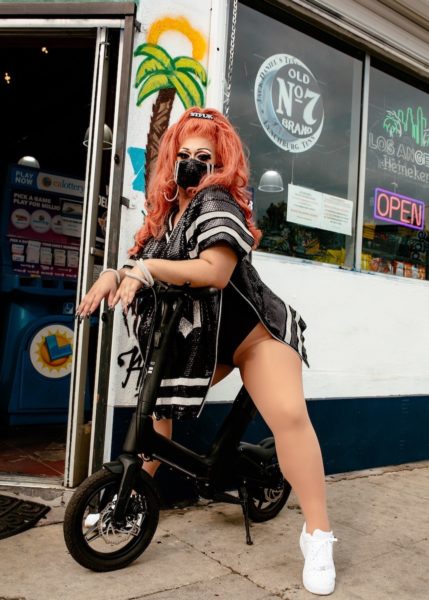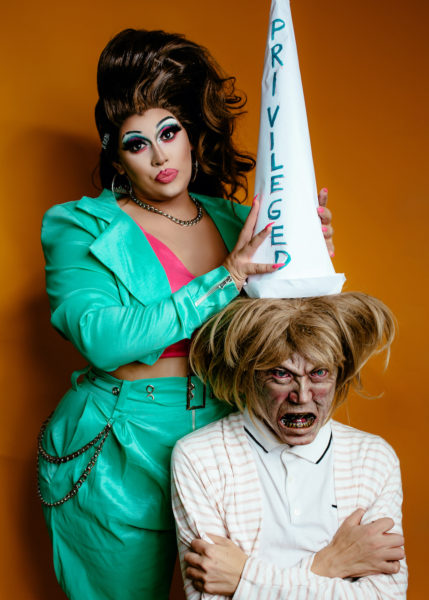“We were sick and tired of being put down,” wrote queer activist Sylvia Rivera in “The Question of Equality: Lesbian and Gay Politics in America Since Stonewall.” “Things just started happening.”

Since the Stonewall demonstration, drag queens and gender queers like Rivera have been at the vanguard of the LGBTQ+ movement. Over half a century later, members of the drag community continues to lend their voices to political causes affecting the queer community. And in 2020, those voices are needed now more than ever.
LGBT activists have complained that over the past four years, Donald Trump’s administration has chipped away at the rights of queer people. On July 26, 2017, he promoted a ban on transgender military personnel via Twitter, despite the fact that, according to the 2015 U.S.Transgender Survey, “USTS respondents served in the military at nearly twice the rate as the people in the U.S. population overall.” More recently, he’s supported the last minute Supreme Court appointment of Amy Coney Barrett, a Catholic fundamentalist who may uproot the results of Obergefell v. Hodges, which ruled that same-sex marriage is legal.
“We give witness that the Church’s teachings… on the meaning of human sexuality in the significance of sexual difference and the complementarity of men and women…and on marriage and family founded on the indissoluble commitment of a man and a woman, provide a sure guide to the Christian life, promote women’s flourishing, and serve to protect the poor and most vulnerable among us.” That statement from the “Letter to Synod Fathers from Catholic Women” was endorsed by Barrett,
So now, with sociopolitical stakes higher than ever, American drag queens are once again lending their voices to the cause as part of our new interview series: “Drag the Vote.” This week, we kiki’ed with Salina EsTitties (neé Jason DePuy) about immigration, overcoming addiction, and the role of drag queens as advocates within the LGBT+ community.
Q. Why is this election important to you?
A. I’m a Latinx person, and my mom’s entire side of the family are immigrants from Honduras. My mom came here when she was 17. I have family that is directly affected by Trump’s laws and the views he’s pushing on America. They are at risk living here in the United States. The idea that my mom can be taken away from me is so scary. It’s happening to people here every day. Kids in cages? Trump is such a monster.
Q. As a queer Latinx person, have you personally experienced bigotry over the past four years?
A. I do have some light-skinned privilege, where I’m passable as a white-presenting person. I understand that I have that privilege. Personally, I struggle with internalized racism. I worked at Barry’s Bootcamp, and it’s primarily white muscle gays. And in my psyche, I’m like, “I’m not white. I don’t belong here. “ I have a lot of friends who feel the same way, and don’t even stay in West Hollywood because of that reason.
As far as interacting with [bigotry] myself, every protest I’ve been at there has been a lady in a car honking and screaming at us for protesting. When I was at a protest for gender violence and protecting trans people, this woman drove by yelling, “Pedophiles! You’re all -fucking pedophiles!”
Q. While Latinx Americans traditionally vote Blue, Trump is gaining support from Latino men. Do you have any family members supporting Trump?
A. I’m not 100% sure, but I have an uncle who’s a cop and he’s very macho Mexican. Like, “Get up you pussy!” That kind of man. I wouldn’t be surprised if he voted for Trump.
Q. Why is it important for the gays to vote this year?
A. Our queer forefathers have been fighting for years to get where we are today. We got gay marriage only a couple of years ago. Trump is trying to go backwards and take away all of our rights. We have to make to get him out of office.
Q. As a long time Angeleno, what do you feel is the biggest issue facing L.A. at the moment?
A. COVID is the biggest one. How are we handling it? How are we reopening safety? Are the numbers going down? Going up? I feel like I haven’t heard much from our mayor and don’t know what’s going on. Are we in lockdown or aren’t we? Along with that, it’s coupled with homelessness, people not affording to pay rent, landlords kicking people out. Homelessness has shot up. Every freeway exit has camps. Homelessness is crazy and I think it’s due to COVID and how i’ts been mishandled.

Q. Another problem facing our city is drug addiction. Didn’t you overcome a drug addiction a few years back?
A. I’ll be nine years sober in November. I feel I’m a very basic, run-of-the-mill gay boy who came out here and got the glamorized experience being up in the hills, and the parties and the boys and the clubbing. And that comes with drugs and alcohol. As one does, I got addicted to crystal meth, which is a very sexy drug. It lends itself to sex and orgies and men and nastiness. Inhibitions are gone. It’s a very common thing for gay men, which I don’t think is talked about a lot. And I fell into that at 19. I got sober a month after I turned 21, and I’ve been sober ever since. There’s a big sober network in Los Angeles that’s very supportive. We’re all around and here to help. Especially now.
Q. What do you think is the best way for Los Angeles to combat drug addiction?
A. Normalize it. It’s not this scary secret. I know these guys that look great on Instagram but are struggling at home and not talking about it. The more we normalize it the more we let people know it’s okay to have a problem. They need to be okay being honest, because from there we can help.
Q. If I remember correctly, part of your recovery involved becoming active in the drag community. Why do you feel drag queens are so important for not just queer culture, but American culture in general.
A. People pay attention to drag queens. They are these big, giant creatures that attract attention. I think it’s our responsibly as drag queens in our queer community to be leaders, and activists, and show up. Out here in L.A. during COVID, everything is locked down, so our drag queens have taken to social media and have been advocating. We are the leaders, the ones at the front of the parade and at the tables talking. Like with these interviews. I hope in WeHo drag queens can be lifted up and given a platform to speak on behalf of West Hollywood and a be a part of the conversation moving forward in the future.
Q. Speaking of the future, what is your biggest hope for 2021?
A. I want everyone to be healthy and safe. Normal is over. So we have to find and create a new way of living. But it can’t be done alone. My hope is that we come together as a community and build something beautiful from the crap we’ve been given this year.

She is a racist – plain and simple and I am tired of her chalking it up to her pain and her feelings. We ALL have pain and we all have feelings – we can’t use it as an excuse to say rotten things, to disrespect other races and to perpetuate the bigotry we all face every single day. She constantly uses the term “WHITE” when putting someone down: “they kept the white bitch”, “she got the white edit” etc If someone said – ‘They kept the black bitch” or “The Latina Bitch”- forget it… there would be an uproar.… Read more »